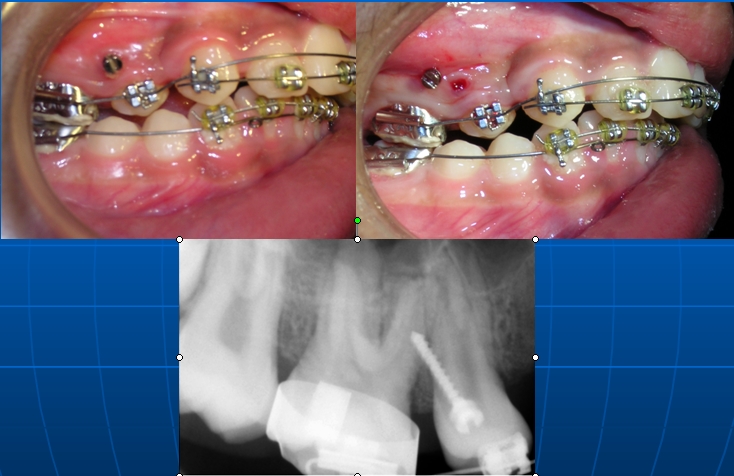Home › Forums › Orthodontics › Microimplant screws for Anchorage in Orthodontics › Microimplant screws for Anchorage in Orthodontics: Risk and Failure
Failures can be mainly immediate or delayed. Further they can be classified into 3 categories
- Host/patient related
- Operator related
- Implant related
Patient Factors
- Systemic disorder in patient
- Smoking habit/ mouth breathing
- Poor quality of bone
- Excessive thickness of mucosa
- Quality of gingival/ perio tissue
- Poor oral hygiene maintenance
- Medications like anti epilepsy
- Radiotherapy
- Diabetes, Osteoporosis
- Site related, more failure in mandible
Operator related
- Faulty surgical procedure
- Self drilling technique is better
- Proper angulation of Implant
- Excessive heat generation
- Large hole during drill use
- Aseptic technique
- Damage to root or nerve tissue
Implant related
- Proper choice of implant length and diameter
- Smaller than 8 mm fail more
- Distortion during placement
- Placement in keratinized gingiva is better when possible
- Use miniplates when anchorage requirement is heavy
- Titanium screws are better, you can easily bond composite on them
- Excessive force application
Risks related to use of Mini/micro implants
Use of microimplants is very easy and hardly has any risks. For discussion- Different types of risks and their solutions are given below
Inadequate primary Stability
- Overdrilled hole
- Bone less than 0.5-0.75 mm around the screw
- Excessive trauma
Delayed mobility
- Implant overloading
- Such screw should be removed and replaced
Temporary Periimplantitis
- Symptomatic treatment
- Oral hygiene instructions
Screw fracture during removal
- If you take it out straight fractire is rare, lateral forces cause #
- If microimplant is left for very long time, this also could be as a result of partial or full osseointegration
Damage to roots
In an animal-experimental study, 20 mini-screws were inserted into the mandible of five beagle dogs. apical X-rays were taken every 6 weeks. Radiographic examination demonstrated damage at three roots because of insertion of the screws.
Histological examination at these three roots demonstrated an almost complete repair of the periodontal structure (e.g. cementum, periodontal ligament and bone) in a period of 12 weeks, following removal of the screws. Clin Oral Implants Res 2005 Oct;16(5):575-8, Root repair after injury from mini-screw
Some other problems could be:
- Tooth Root impingement- periodontal space or cementum- Follow proper method
- The mucosa would turn with the drill when attempting to drill the pilot hole (solutioin- place incision and drill )
- Oro-antral communication- normally it is 2mm or less it is of no consequence
- Soft tissue irritation –buccally or on gingiva (ligature)-• Use guides to avoid gigival impingement
- Soft tissue coverage of Mi and auxillary, take special care of angulation and type of head of Mi specially near loose mucosa areas
- Nerve impingement -To avoid nerve injury and slippage, do not use screws longer than 8 mm in retromolar area
- Air Subcutaneous emphysema- use of air rotor or air syringe near loose mi mucosa can lead to this condition
- Screw slippage into mucosal spaces-This should be carefully avoided by following proper technique
See the radiograph, here 2 retro molar pad screws slipped and entered posterior submandibular space. Buccal flap was raised to remove them by oral surgeon. Patient reported mild paresthesia at commissure of lower lip.

Failure examples
Typical Failure how it looks like

See below how the ulceration was caused and it healed after covering screw head with composite, lower image shows ulceration in lower arch, failure as well as ulceration is more in mandible in this area compared to maxillary arch.


Here you can see a case where screw went into perio space and caused mesial movement of premolar, it was removed and replaced in the same visit. Radiograph did not show any anomany and treatment continued unhindered.
